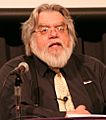Christ myth theory facts for kids
The Christ myth theory is an idea that suggests the person named Jesus in the Bible's Gospels was not a real historical person, but rather a myth. It's important to understand the difference between a myth, something historical, and fiction. A historical person is someone who actually lived. A myth is a traditional story, often about heroes or events, that might explain beliefs or natural events, but isn't necessarily true in a factual way. Fiction is a made-up story. Because these words have different meanings, people have different ideas about how Jesus in the Gospels might be seen as a myth.
Contents
What is the Christ Myth Theory?
The Christ myth theory suggests that the story of Jesus is similar to myths about other ancient gods or heroes. It proposes that the idea of Jesus started as a religious belief or a spiritual figure, and then stories were created about him as if he were a real person.
Why do people think this?
People who support this theory often point to a few reasons:
- They say there aren't many non-Christian writings from Jesus's time that clearly prove he existed.
- They argue that some parts of the Jesus story are very similar to older myths from different cultures.
- They believe that early Christian writings focus more on Jesus as a spiritual idea than as a living person.
Different Views on the Theory
Not everyone who believes in the Christ myth theory agrees on everything. Some think Jesus was entirely made up. Others believe there might have been a real person named Jesus, but that the stories about him were greatly exaggerated or changed over time into a myth.
Arguments Against the Theory
Most historians and Bible scholars do not agree with the Christ myth theory. They believe there is enough evidence to show that Jesus was a real person who lived in the 1st century.
Historical Evidence for Jesus
- Biblical Accounts: The Gospels and other parts of the New Testament describe Jesus's life, teachings, and death.
- Non-Christian Writers: Some ancient Roman and Jewish writers, like Tacitus and Josephus, mention Jesus or early Christians. These writings are not detailed biographies, but they suggest that Jesus was known to exist.
- Early Christian Movement: The rapid growth of the Christian religion shortly after Jesus's time is seen by many as strong evidence that a real person inspired it.
Scholarly Consensus
The vast majority of scholars who study ancient history and the Bible agree that Jesus was a real historical figure. They might disagree on many details of his life, but they generally accept that he existed.
Key People in the Theory
Over the years, several scholars and writers have discussed or supported the Christ myth theory.
Early Thinkers
- Constantin-François Volney (1757–1820): A French historian who compared the Jesus story to ancient myths.
- David Strauss (1808–1874): A German professor who wrote about the mythical elements in the Gospels.
- Bruno Bauer (1809–1882): Another German professor who argued that Jesus was not a historical person.
- Arthur Drews (1865–1935): A German philosopher who was a strong supporter of the Christ myth theory.
Modern Supporters
- Richard Carrier (born 1969): An American historian and philosopher who writes about the theory.
- Robert M. Price (born 1950): An American New Testament scholar who supports the idea.
- Tom Harpur (1929–2017): A Canadian author who wrote about the mythical origins of Jesus.
Conclusion
The Christ myth theory is an interesting idea that challenges traditional views about Jesus. While it has been discussed by some thinkers, most historians and scholars believe that Jesus was a real person. The debate continues, but understanding the different viewpoints helps us learn about how people interpret history and religious stories.
Images for kids
-
A 3rd-century fragment of Paul's letter to the Romans
-
French historian Constantin-François Volney, one of the earliest myth theorists
-
German Professor David Strauss
-
British academic John M. Allegro
-
Canadian author Tom Harpur
See also
 In Spanish: Teoría del mito de Jesús para niños
In Spanish: Teoría del mito de Jesús para niños
 | May Edward Chinn |
 | Rebecca Cole |
 | Alexa Canady |
 | Dorothy Lavinia Brown |










